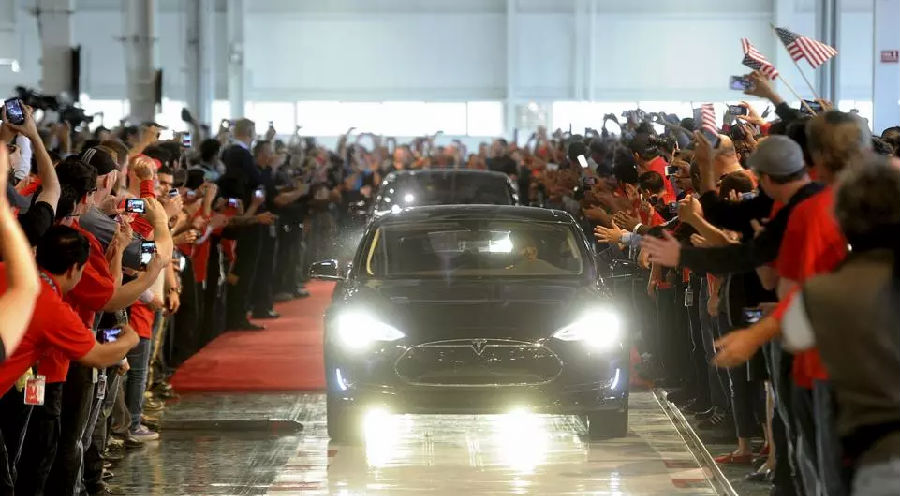During a conference call with Wall Street investment analysts in May, Musk, who declined to be interviewed for this story, had refused to answer basic questions about Tesla's faltering financial prospects.
今年5月,馬斯克在與華爾街投資分析師的電話(huà)會(huì)議中,拒絕就此事接受采訪,也拒絕就搖搖欲墜的金融前景回答基本問(wèn)題。
“Boring, bonehead questions are not cool,” he said. Investors responded by lopping 5.6 percent off his company's stock price the next day.
“無(wú)聊的傻瓜問(wèn)題一點(diǎn)都不酷,”他說(shuō)。第二天,投資者的回應(yīng)是將公司股價(jià)砍掉5.6%。
A few months before, Musk treated his 22 million Twitter followers to harassing rants against reporters who published critical pieces about Tesla, accusing them of bias, conflicts of interest and outright fabrications—also without evidence.
幾個(gè)月前,馬斯克在他的2200萬(wàn)粉絲的推特上,怒懟那些發(fā)文章評(píng)論特斯拉的記者們,說(shuō)他們門(mén)戶(hù)之見(jiàn),因利益沖突就一派胡言。這次依然沒(méi)有證據(jù)。
He threatened to start a news site that evaluates the accuracy of news articles, tentatively called Pravda—
他威脅要建立一個(gè)評(píng)估新聞報(bào)道的準(zhǔn)確性的新聞網(wǎng)站,暫時(shí)叫《真理報(bào)》
the Russian word for “truth,” but better known as the propaganda newspaper of the Communist Party in the former Soviet Union, and now of Russia.
(這個(gè)英語(yǔ)單詞是俄語(yǔ)的“真理”),但這是前蘇聯(lián)共產(chǎn)黨、現(xiàn)俄羅斯的宣傳報(bào)。

Critics and allies alike began asking:
批評(píng)者和盟友都開(kāi)始問(wèn):
What happened to Elon Musk, the hero of Silicon Valley, the high-tech visionary who was going to save the planet with electric vehicles?
硅谷英雄伊隆·馬斯克,這個(gè)打算用電動(dòng)汽車(chē)拯救地球的高科技?jí)粝爰以趺戳耍?/div>
But if you're focusing on Musk's “bad manners,” as he called his meltdown, you're missing the point.
但是如果你過(guò)于關(guān)注馬斯克的那些“壞習(xí)慣”(他自己如此稱(chēng)自己的失控),那么就會(huì)錯(cuò)過(guò)重點(diǎn)。
His plan to transform the car industry is picking up speed.
他改造汽車(chē)工業(yè)的計(jì)劃正在加速。
Along the way, it could put tens of millions of people out of work (and that's not a bug, it's a feature), dismantling what has been a foundation of the nation's social and economic life for a century.
在此過(guò)程中,可能會(huì)有數(shù)千萬(wàn)人失業(yè)(這不是一個(gè)漏洞,這是一種特性),會(huì)拆除一個(gè)世紀(jì)以來(lái)美國(guó)社會(huì)和經(jīng)濟(jì)生活的基礎(chǔ)。
And it's happening in the service of plying the wealthy with cooler cars.
這會(huì)誕生于為富人提供更酷的汽車(chē)服務(wù)。
“Technological innovation has throughout history increased total wealth,” says Ryan Lackey, a founder of cybersecurity company ResetSecurity and a veteran Silicon Valley entrepreneur.
“縱觀歷史,技術(shù)創(chuàng)新增加了總財(cái)富,” 網(wǎng)絡(luò)安全公司ResetSecurity的創(chuàng)始人同時(shí)是經(jīng)驗(yàn)豐富的硅谷企業(yè)家瑞恩·拉基說(shuō)道。
“But it's often said the gains are going to a smaller and smaller subset of the population.”
“但眾所周知,收益會(huì)流向越來(lái)越少的人群。”
So the worrisome future may be one not where Musk fails but where he succeeds.
因此,令人擔(dān)憂(yōu)的未來(lái)可能不是馬斯克失敗的地方,而是他成功的地方。
譯文由可可原創(chuàng),僅供學(xué)習(xí)交流使用,未經(jīng)許可請(qǐng)勿轉(zhuǎn)載。












